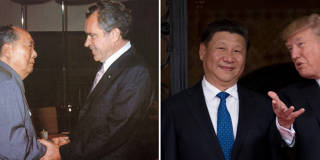Donald Trump’s “America first” approach to US foreign policy would seem to create an opening for China to assert itself more forcefully on the world stage. But that assumes what remains to be seen: whether China’s leaders can reinvigorate their country’s decaying socioeconomic model.
- David Shambaugh, China’s Future (Polity, 2016)
- Minxin Pei, China’s Crony Capitalism: The Dynamics of Regime Decay (Harvard University Press, 2016)
- Frank Pieke, Knowing China: A Twenty-First Century Guide (Cambridge University Press, 2016)
- Jonathan Fenby, Will China Dominate the 21st Century? (new ed. Polity, 2016)
- John Pomfret,
- Julian Gewirtz, Unlikely Partners: Chinese Reformers, Western Economists, and the Making of Global China (Harvard University Press, 2017)
- Jeffrey Wasserstrom, Eight Juxtapositions: China through Imperfect Analogies from Mark Twain to Manchukuo (Penguin, 2016)
OXFORD – Donald Trump and Xi Jinping’s summit at Mar-a-Lago, the US president’s gilded Florida home, is the latest chapter in a long, often turbulent, but increasingly vital history of Sino-American engagement. In the World War II era, veterans of the Chinese Nationalist government, such as the financier T.V. Soong and the wife of the Nationalist leader, Madame Chiang Kai-shek, variously paraded and padded around Washington’s corridors of power. When President Richard Nixon and Chairman Mao Zedong met in Beijing in 1972, there was a palpable sense that they were reorienting the world. When Deng Xiaoping became the first senior Chinese Communist leader to visit the United States, in 1979, he famously donned a cowboy hat during a trip to Houston.
In the four decades since, the US and China have developed the world’s most important bilateral relationship, owing largely to the thickening cords of trade and investment that now bind the two countries in a web of interdependence. But there is a sense that the Florida summit represents another turning point. Trump’s protectionist inclinations are a source of growing tension, as is his implied ultimatum regarding North Korea: unless China helps to “solve” the problem of North Korea’s burgeoning nuclear weapons program, the US may act on its own. All of this gives new urgency to a spate of recent books that seek to explain China to the outside world and parse its relations with the US.
China’s Long March to Decay?
A new tone characterizes many of these books. For much of the 2000s, there was a tendency to view China as a rising hegemon whose economic and military strength would inevitably give it pole position in Asia, and possibly a major role in global leadership. The stark contrast between China’s double-digit economic growth and the West’s malaise after the 2008 financial crisis seemed to give weight to this interpretation.

OXFORD – Donald Trump and Xi Jinping’s summit at Mar-a-Lago, the US president’s gilded Florida home, is the latest chapter in a long, often turbulent, but increasingly vital history of Sino-American engagement. In the World War II era, veterans of the Chinese Nationalist government, such as the financier T.V. Soong and the wife of the Nationalist leader, Madame Chiang Kai-shek, variously paraded and padded around Washington’s corridors of power. When President Richard Nixon and Chairman Mao Zedong met in Beijing in 1972, there was a palpable sense that they were reorienting the world. When Deng Xiaoping became the first senior Chinese Communist leader to visit the United States, in 1979, he famously donned a cowboy hat during a trip to Houston.
In the four decades since, the US and China have developed the world’s most important bilateral relationship, owing largely to the thickening cords of trade and investment that now bind the two countries in a web of interdependence. But there is a sense that the Florida summit represents another turning point. Trump’s protectionist inclinations are a source of growing tension, as is his implied ultimatum regarding North Korea: unless China helps to “solve” the problem of North Korea’s burgeoning nuclear weapons program, the US may act on its own. All of this gives new urgency to a spate of recent books that seek to explain China to the outside world and parse its relations with the US.
China’s Long March to Decay?
A new tone characterizes many of these books. For much of the 2000s, there was a tendency to view China as a rising hegemon whose economic and military strength would inevitably give it pole position in Asia, and possibly a major role in global leadership. The stark contrast between China’s double-digit economic growth and the West’s malaise after the 2008 financial crisis seemed to give weight to this interpretation.